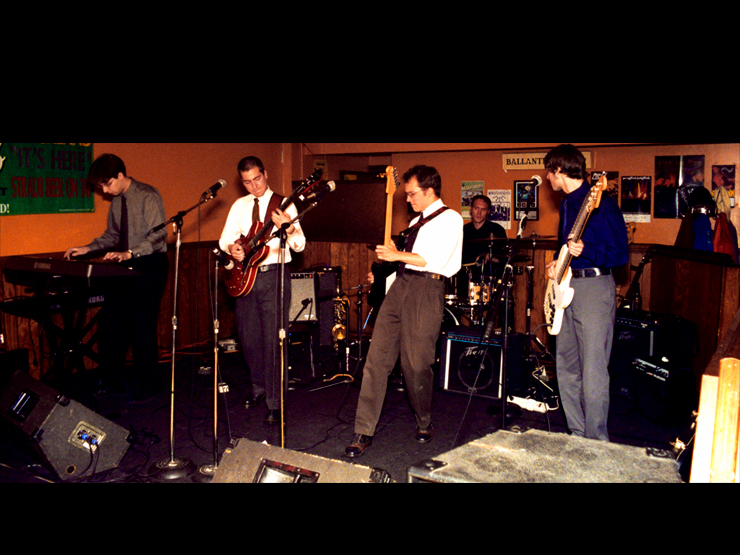The Concord: A Band
Originally published in 2007
In February 2002, colleagues and onetime classmates — Michael Ubaldi, Gabe McElwain, Jonn Sokol, Charlie Druesedow and Dave Molnar — formed a rock band. The five played not ten shows, recorded twelve songs, released two singles and on February 14, 2003 broke up.
They called themselves the Concord.
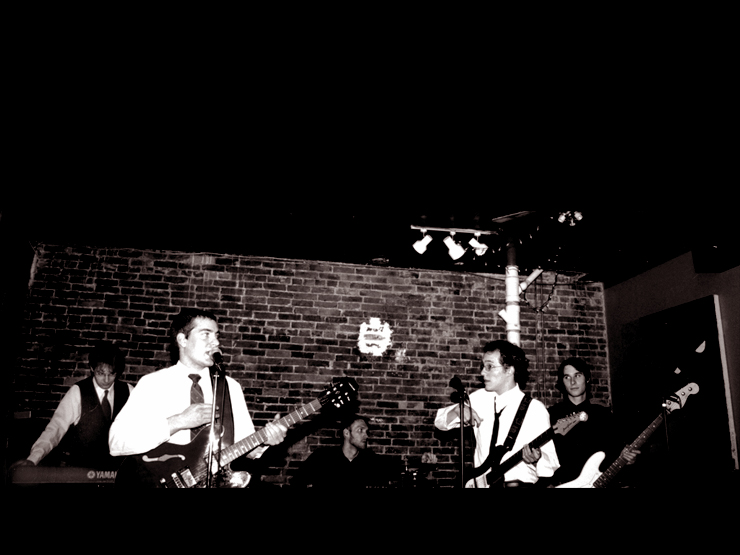
Not Quite By Intention
No one remembers whose idea it was, but in the spring of 1997, Gabe, a high school sophomore, pitched it in a letter to his college freshman friend, Michael: the two would join a few others to form a cover band of immemorial group The Cure.
Like any plans for summer activities, these changed. When enthusiasm for covers ebbed, the several would "find a scrap yard" and record metal hitting metal, in the tradition of band Einsturzende Neubauten. Then something else. As summer approached, novelty having long passed, Michael and Gabe were the only two left interested.
The pair settled on recording electronic music inspired by contemporary favorites.
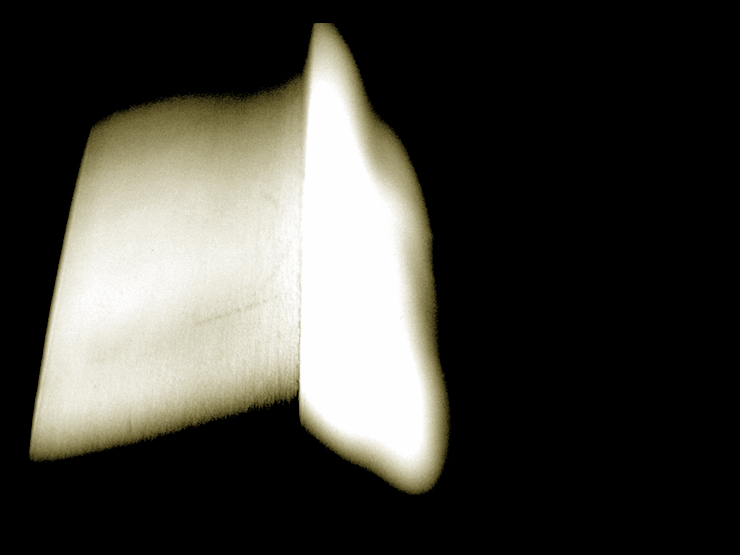
"Gabe and I set off," remembers Michael. "This too might have ended a velleity if I hadn't have discovered the semester before, at Syracuse University, programs on everyday desktop computers for digital recording and editing. Recall that, in the late 1990s, not only were computers and electronics more expensive but the 'home studio,' too, was still partly a concept. Digital recording equipment at the consumer level was uncommon, and it was comparatively simplistic. Yet — as one fascinated by sequencing, and music made with pulses and noises — as soon as I knew it was possible, I spent hours on my roommate's computer using a very basic application to arrange the sounds of nearby objects."
Despite enthusiasm, the two faced a few realities of the last decade. Michael came home from school that May with a certain editing program in hand. Neither he nor Gabe owned a computer at the time, however, so they asked Gabe's brother — home from college himself — for use of his. He obliged.
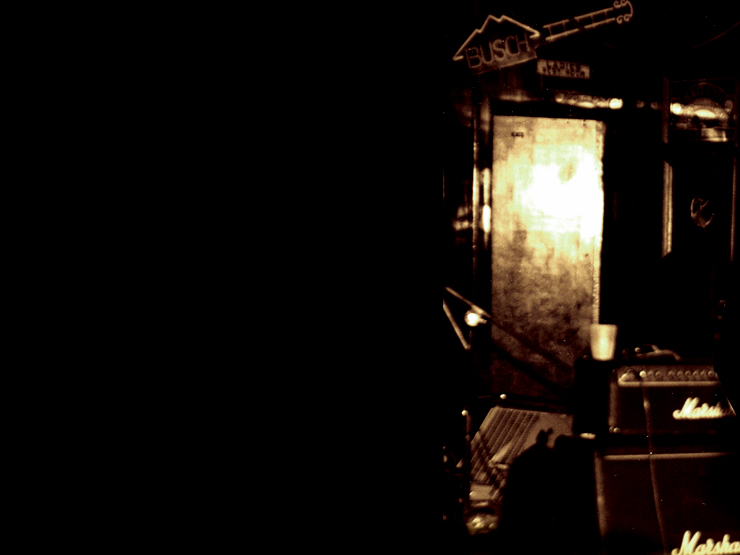
Over the summer of 1997, sounds were collected with Gabe's four-track tape recorder; transferred to computer and spliced into layered rhythms. "The program wasn't multitrack, so placing one phrase over another was tedious, and would have been unbearable if we had done it once before in our lives. Instead, those sessions went by like the aimless joy of somebody opening MS Paint for the first time."
By the middle of August, a two-minute percussion instrumental was complete. As Gabe readied for his junior year, Michael returned to Syracuse with a cassette tape of the tiny production. The recording was played for a few friends and then stowed, but the successful project gave the two confidence in their work and its unique methods, as well as curiosity about what else Gabe and Michael could put together — and where that might take them.
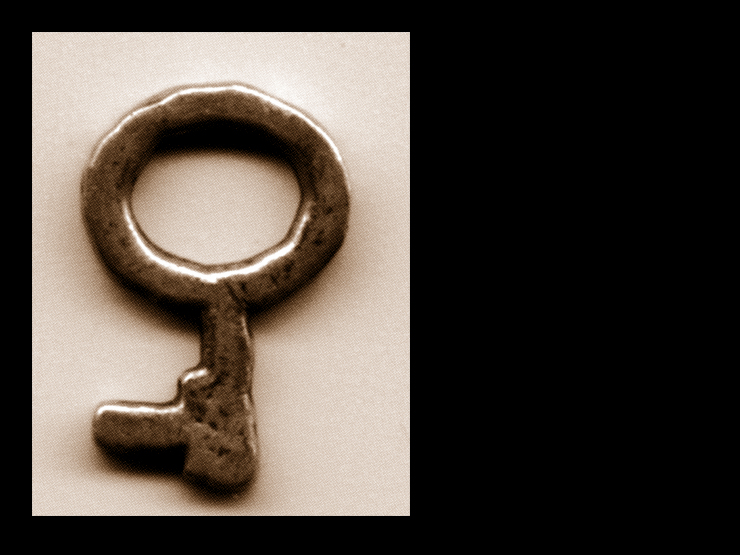
The Compilation
Collaboration went on for the next two and a half years, a slow-moving side project to studies and, for Gabe, more immediate musical commitments. Michael brought a computer to the dormitory with him in the fall of 1998, devoting hours outside of class time to techniques in editing and producing.
"This was pure exploration," notes Michael, "I was mostly playing around — even if electronic music weren't, as Quincy Jones put it, 'Like painting a 747 with Q-Tips.'" Whereas Gabe had written during this time, for a four-piece back home, a score of tunes, the side project resulted in no more than half a dozen.
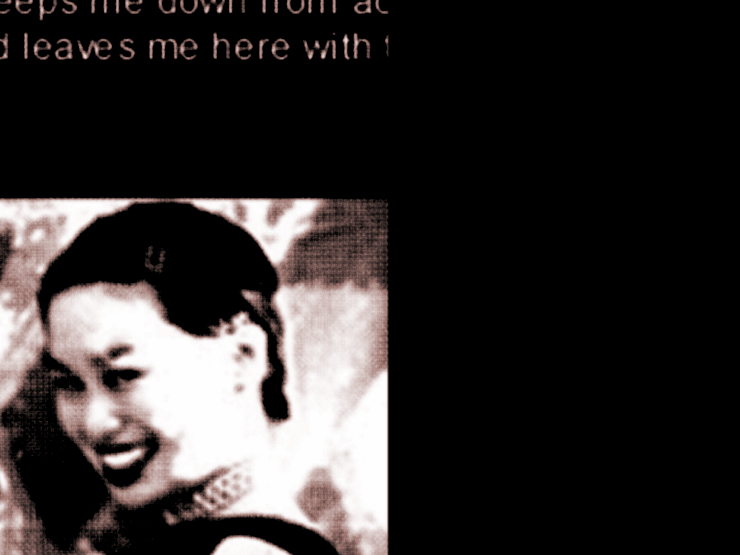
By the summer of 1999 that handful of experimental songs was enough for the two to consider a full-length disc.
Work, still sluggish, benefited from instrumental performance: "It didn't take long for each of us to get the need to construct a song from hitting pots, pans and an ottoman totally out of our systems. Gabe could play guitar and a little drum and piano; I could plink on the piano was competent on saxophone; and we could both sing. We invited a mutual friend, Nicole Born, to provide some vocals. Electronic and atmospheric treatments became part of a synthesis that would yield songs in the styles Gabe and I never really got away from — pop and rock."
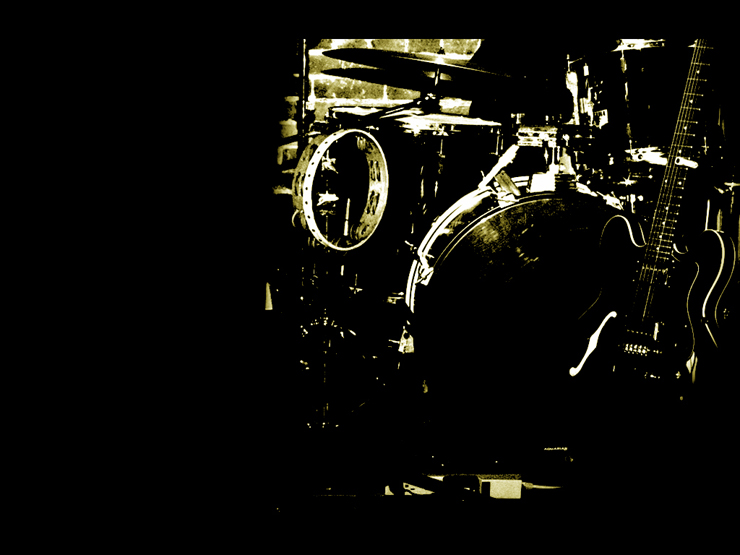
Another inseparable quality was colorful ambition. At the end of the 1999 Christmas holiday, Gabe and Michael finished a compilation titled Figure Concord under the sobriquet "Museum." Copies of a disc and an eight-page booklet were sent to friends and a few labels; also, to Alan Wilder, a former member of Depeche Mode whose work was an inspiration, and who openly accepted discs from fans.
"We believed in the work," says Michael, "and although promotion is to be undertaken without shame both Gabe and I acknowledge some embarrassment about flashing our peculiar, bombastic little album. In a cover letter, with such preterition, I asked Alan for a leg up, or at least a good word. He sent back an autographed glossy and a tactfully reticent answer. We took this as good reason to focus less on great expectations and more on music."
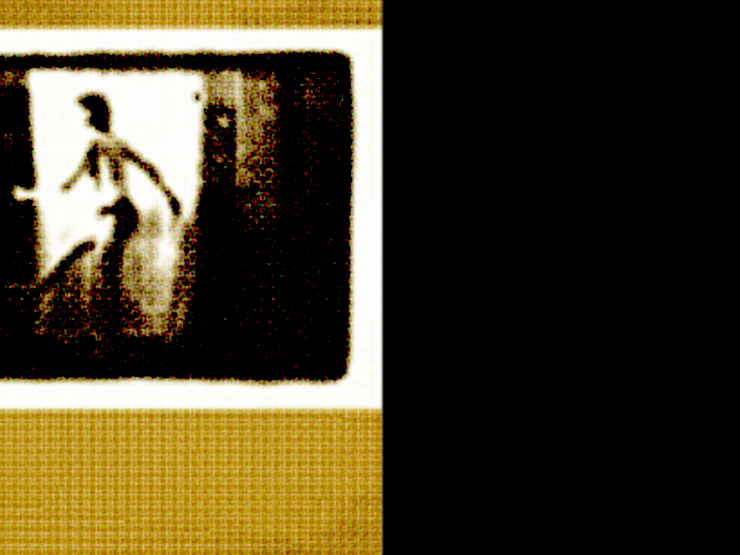
'I'm Ready Now'
Years 2000 and 2001 saw different semblances of what was becoming a proper band. None of them went very far. Nevertheless, songs from the compilation were retained and realized with live instrumentation, the project gradually assuming a new name: the Concord. The first ensemble included Nicole playing bass, and added old classmates and marching band comrades Jonn Sokol on keyboards and Eric Wahl on drums. Another briefly added acquaintance Danny O'Brien on guitar. Toward the end of 2001, after Michael had begun assembling a semi-portable studio and recording bands, these later and more formal attempts were captured on tape at Michael's church.
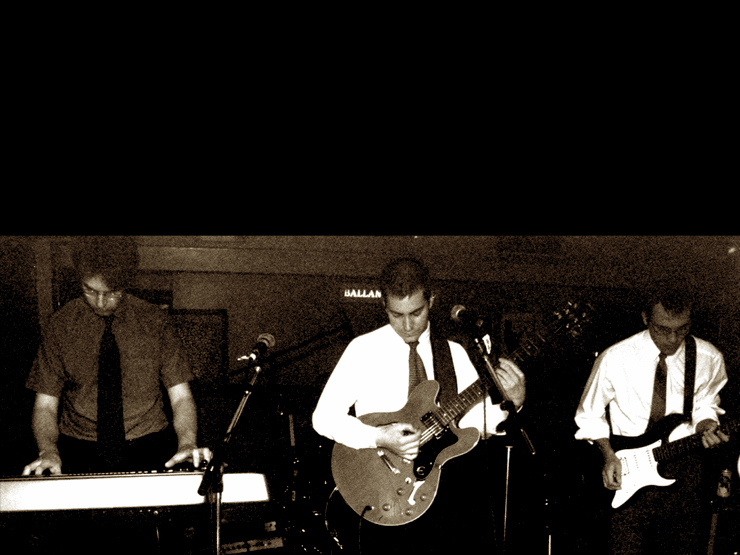
What was lacking through all this was a real band. At the center of every session were Gabe and Michael, period. Other members came and went without significant investments in either the group or the music. In a conversation between the two in February 2002, Michael confessed, "If everybody is interested in bringing things to the table and making songs their own, I'm game for more Concord." Jonn, pursuing his undergraduate but across town, could be relied on. What else was needed? A bassist and a drummer, they decided.
One name that came up — Charlie Druesedow — drummed for a band whose album Michael had recently been hired to record. He might be perfect, "Assuming we could coax Charlie into playing," Gabe mused.
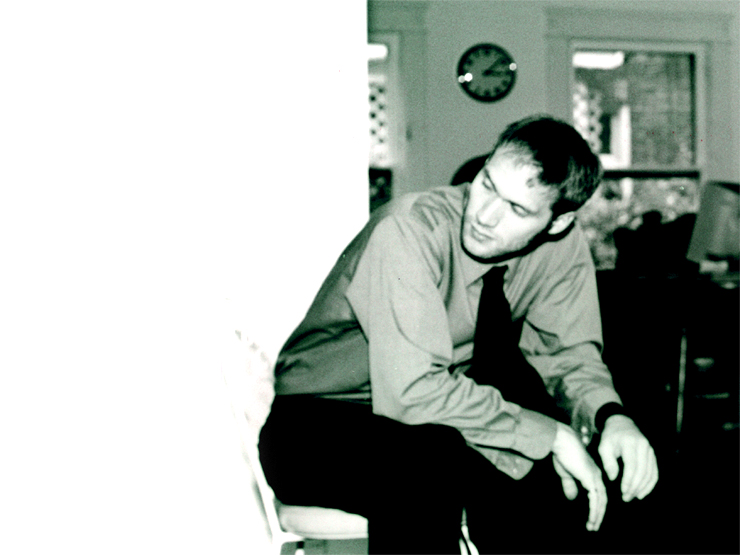
Providentially, Charlie needed no coaxing. The next day, after a drum tracking session, Charlie brought up the compilation with Michael — he had listened to it, loved it, and wanted to help "if you ever, you know, need a drummer." Charlie's bandmate, Dave Molnar, happened to just enter the room. Overhearing, he spoke up: "I can play guitar or bass, if you want."
As Michael wrote to Gabe that evening, "I didn't know what to say other than 'yes, of course, as soon as things come together a bit more. Think this summer, maybe,' to which Dave replied, 'Even before summer, really. I'm ready now.'"
Charlie and Dave were competent, indefatigable musicians, raised on classic rock but steeped in academics. Michael had worked with them once before — a gig landed, he claims, through his "ability to perform the solo shriek in Pink Floyd's 'Careful with that Axe, Eugene'" — and knew well of their abilities. In his sign-off to Gabe, after delivering the news, he wrote, "If there's some time and material, in the not-so-distant future...yes. Full band playing nice songs."
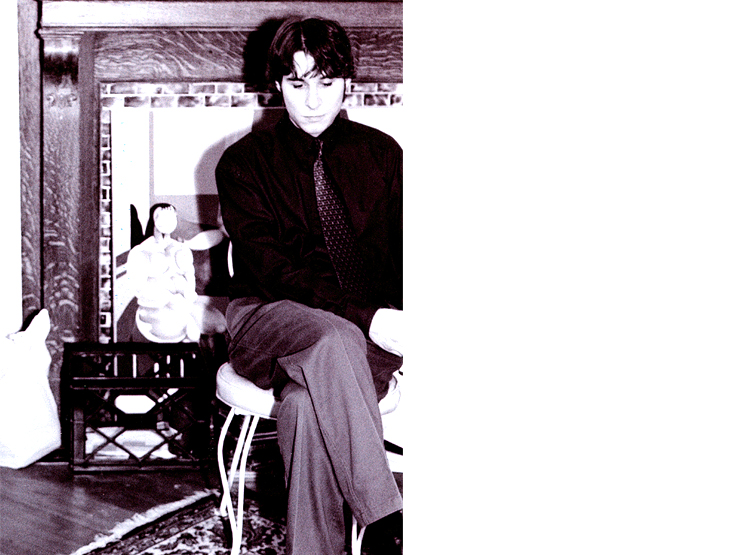
Full Band, Nice Songs
The five — Michael, Gabe, Charlie, Dave and Jonn — agreed to play as a band. Having already graduated from college, Dave and Michael began meeting at Dave's soon after for evening sessions, so as to help prepare for the first practice with the other three in March.
There was a necessary irony in those get-togethers, five years after an electronic and otherworldly start: "It was an encyclopedia entry for 'back to the basics.' Here we were, Dave and myself, sitting on stools with guitars in our arms, improvising."
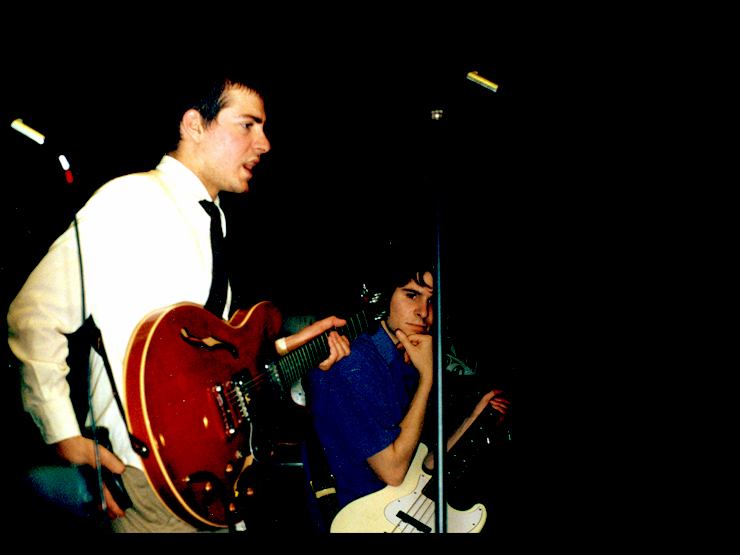
March arrived and the plenary rehearsal was held. Immediately obvious was the group dynamic that would characterize the band from start to finish: five musicians, each talented, composers in their own right; bringing neither pretense nor conceit but rather whatever contribution was necessary for a song.
"When we talk about the band days, we'll mention the ease with which we worked. No arguments, no 'creative differences.' None of us has had an experience where unity, deference and exclusion all occurred at the appropriate times, every time. Not before or since."
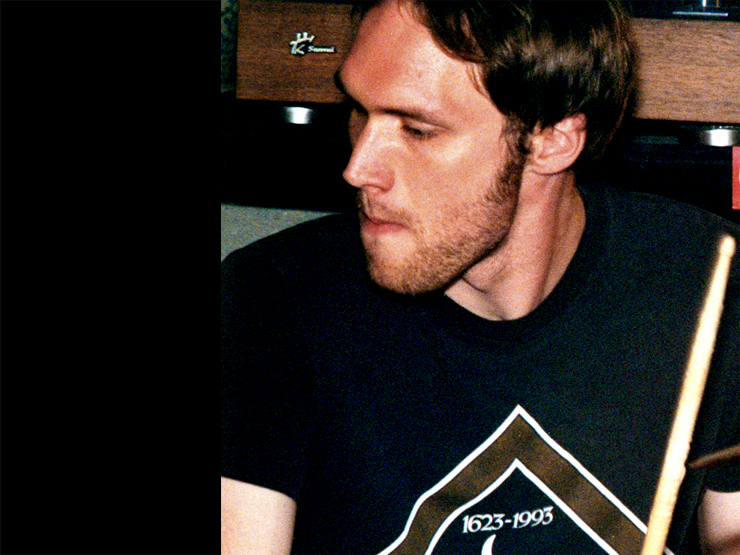
With Gabe, Jonn and Charlie returning to school for the next three months, the band decided to reconvene in June for a stage debut in July.
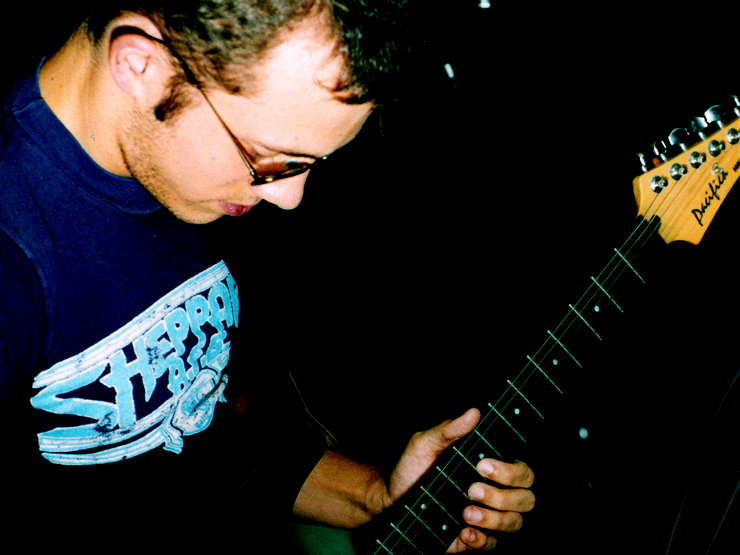
Members would need to do a lot of work in the intervening weeks. The group required a setlist long enough for a performance but that could be learned in a months' rehearsal time. For variety, even stylistic context, a cover song would be included. Whatever the band was to play, it had to be acceptable to proprietors — which meant it had to be heard, necessitating a demo tape. Promotion would be most effective with a website, while pictures could relate the look of the band to those who hadn't yet attended a show.
Paul Levar, a friend of Gabe and Michael's, had just graduated with a bachelor's in photography. "Did we approach Paul or did he us? Either way Paul documented the Concord in near entirety — and deftly. Paul may say that he gained experience, but for the tiny sum we paid him to accompany us, the bargain was ours."
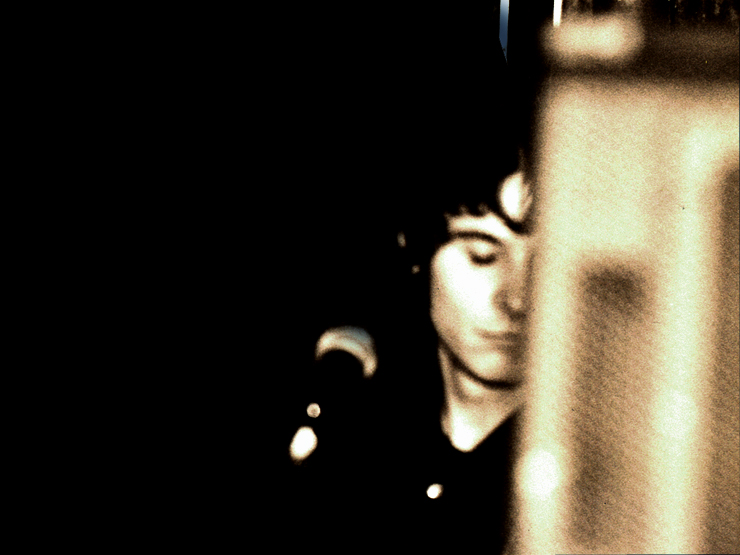
The sartorial decision was an effortless one. How should the band look? Reasoned Dave: "Why don't we just dress like Ubaldi?"
But for minor exceptions at the first show, the Concord would take every stage in dress shirt, slacks and tie.
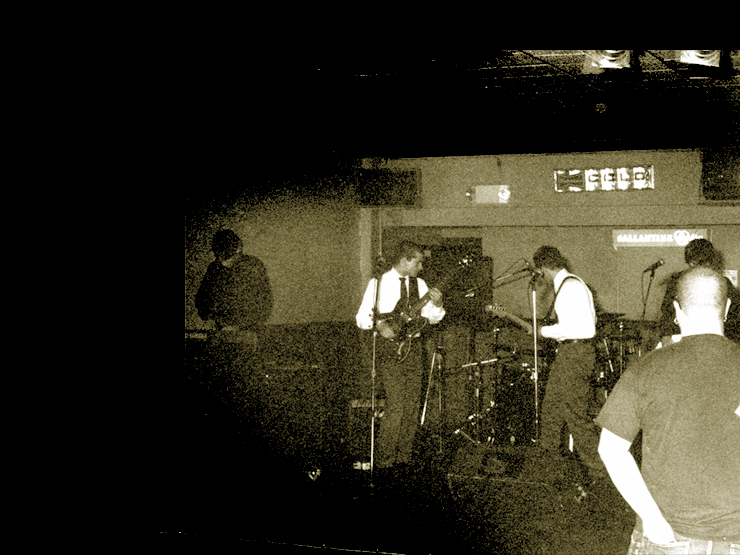
Onstage
Early evening, July 13, 2002, the five filled three cars with equipment and drove into Cleveland, heading for a place called Pat's in the Flats.

"The gig was a triumph," remembers Michael. "Any nerves were channeled straight through the front-of-house. I'll never forget looking out into the crowd of a couple dozen and seeing heads bobbing up and down to the beat. We ran through our set, warmed the audience so well that it cheered down a drunken heckler, played an encore — and for the first time in my garage band experience, accepted compliments afterward from perfect strangers."
Such a reception would characterize each performance of the band's short run.
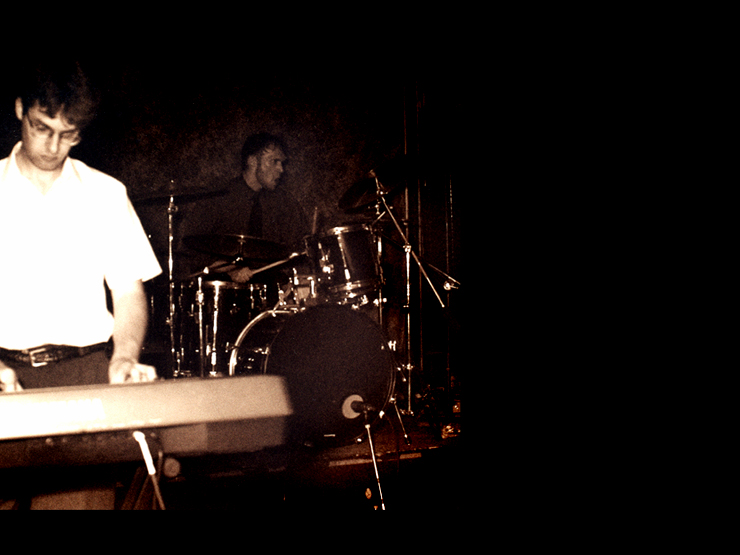
Shows were advertised in part by hanging distinctive, if abstruse, posters.
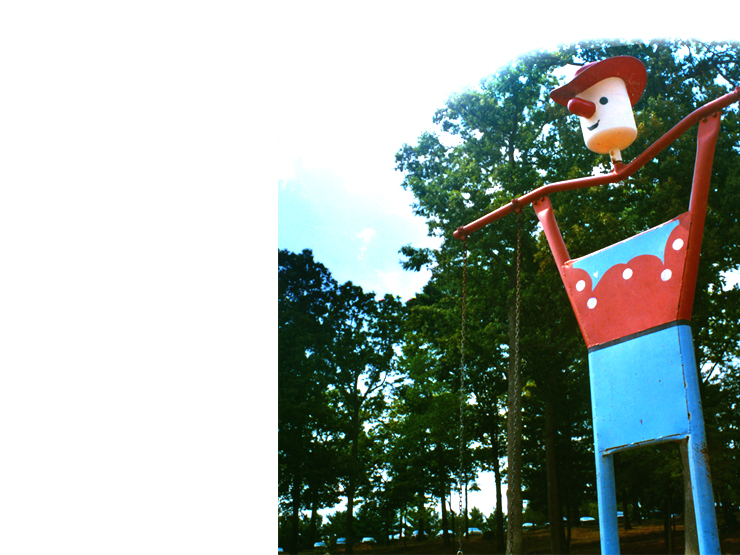
The five drew up a long mailing list of enthusiasts, met like-minded performers, and enjoyed themselves thoroughly.
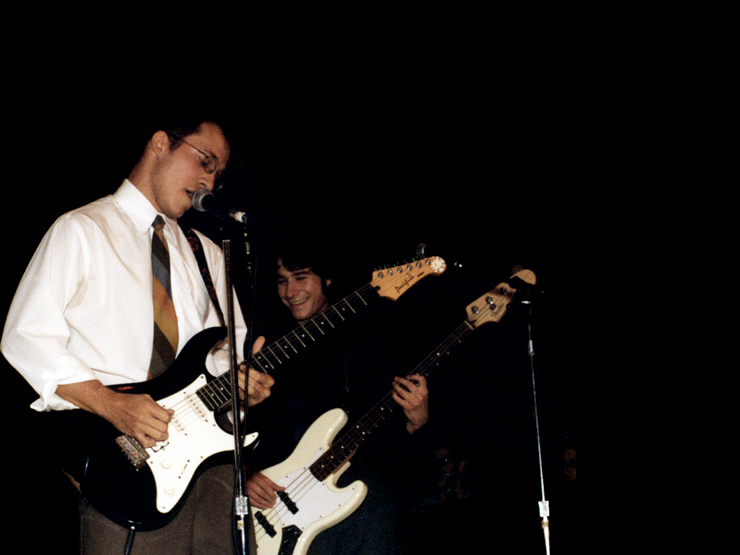
During the months of August and September, the band reserved two locations for the recording of twelve songs.
Michael reflects: "Since we weren't renting space or service, there may have been the inclination to take as long as we wished. The project leading me to Charlie and Dave went on forever, and though I enjoyed all that traipsing about earlier in the year, the Concord didn't have the time — nor I the patience — to undertake recording without a solid plan and schedule. Besides, our music was organized by virtue of our playing live. We were quite ready to work."
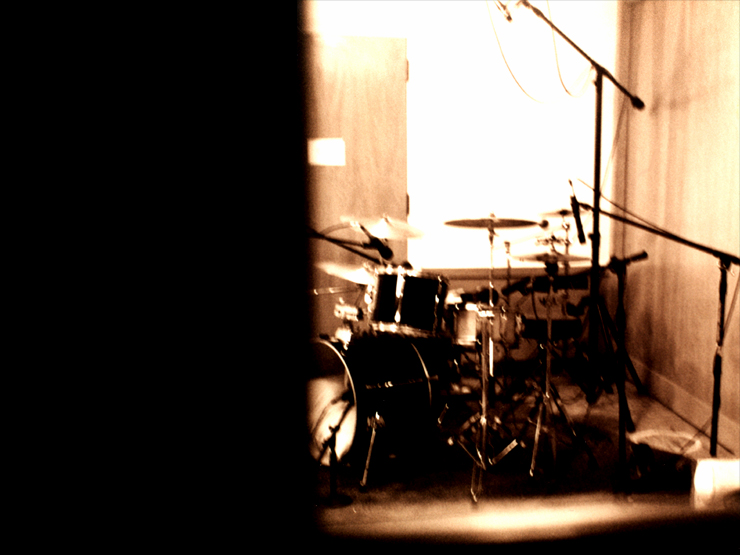
'In Departing the Concord'
By early October, Gabe and Jonn had left to complete their respective undergraduate degrees. Dave and Charlie turned their attention to other bands and projects. Michael, at first unsurprised by the accompanying lull, grew increasingly concerned about a lack of signs of interest from the others that neared stark indifference. While hardly unexpected for busy individuals with many commitments and hobbies, it contradicted the zeal apparent a few months before. Charlie's sincere reassurances, followed by fresh band sessions and three shows on the cusp of the New Year, briefly lightened worries.
But as a cold winter set in, frustrations returned and swelled, money now being spent for advertising of the band to record labels.
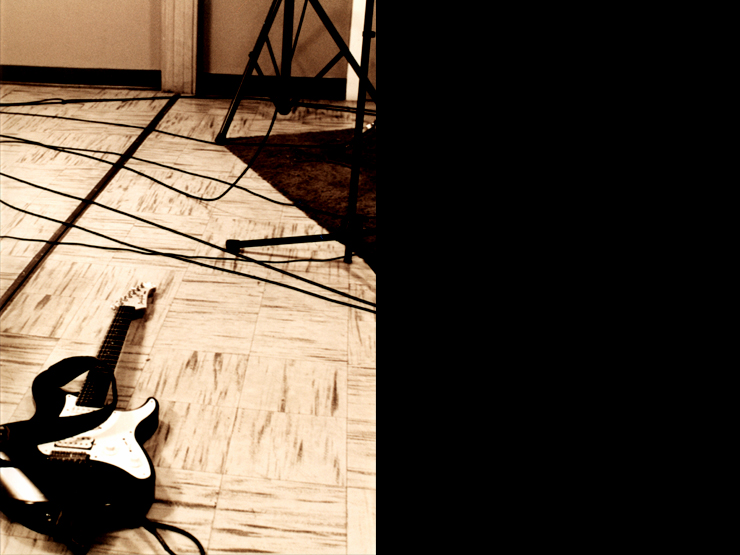
A phone call on Friday, February 14, 2003 settled the matter. The band from which Charlie and Dave had been borrowed struck an independent record deal, Michael was told by leader Ben Gmetro — and a summer tour was now a strong possibility.
"The pair was got in a Faustian contract with Ben. Now time had run out. As Dave and Charlie couldn't be in two places at once, Ben's precedence meant plans for my band were postponed indefinitely. In spite of good intentions of the others, the Concord was now a one-man band."
The moment he hung up the phone, Michael wrote a letter and the next morning mailed it to each of the members. "No long goodbyes or slow deaths — I work at right angles. Sic transit gloria Concordia...
"...or so I thought."
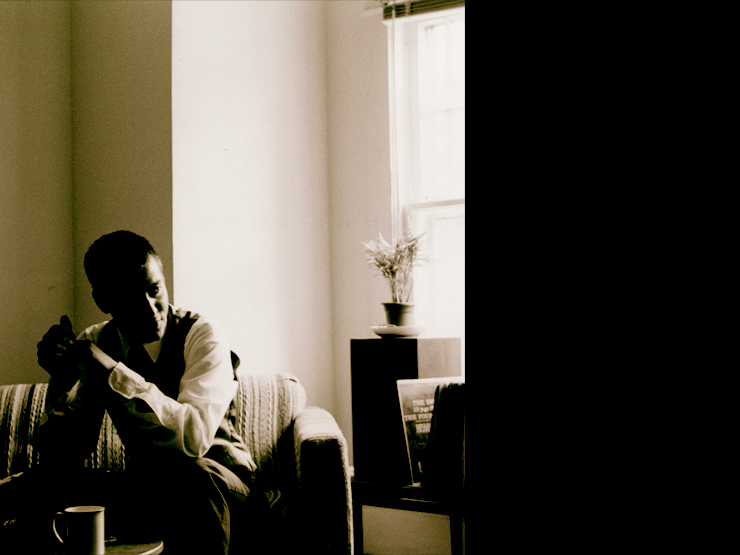
What was expressed in the letters instructed Michael after the breakup. For four years, the band's album would be completed in his spare time. "I returned to the slow, didactic methods of ten years ago. Intending to complete the album, I spent thousands of hours using those songs to truly learn how to mix. My production skills in 2002 and 2003 were adequate, but neither satisfying to me nor dignifying to what we five could create together on a stage."
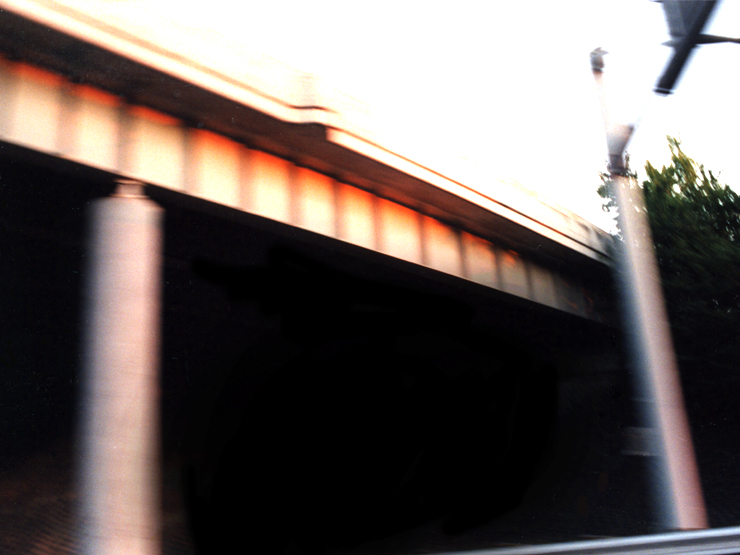
Keeping in touch with Gabe and Jonn, Michael sent periodic — and likely pertinacious — reports on the album's progress.
In 2006, he shouted from an alleyway to Charlie's over-the-shop apartment, bringing Charlie a collection of seven songs.
A year later Michael visited Dave for the first time since 2003, "standing on his back porch after dark, like out of a movie, holding out a disc."
Michael wasn't the only one convinced that the Concord's music always had something more to it. Each of the other four was not only pleased to hear their work in a definitive form, but favorable to the idea of releasing an album.
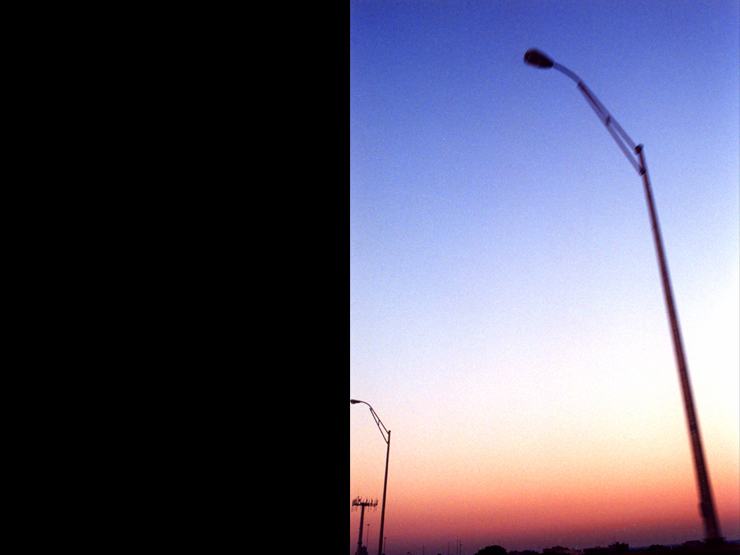
Attendant to the record would be a narrative of the band as well as a critical reflection on the songs themselves. "Here is the Concord; its story and music. Such is the best way to bring chapter's end."
Read about the Concord's album.
